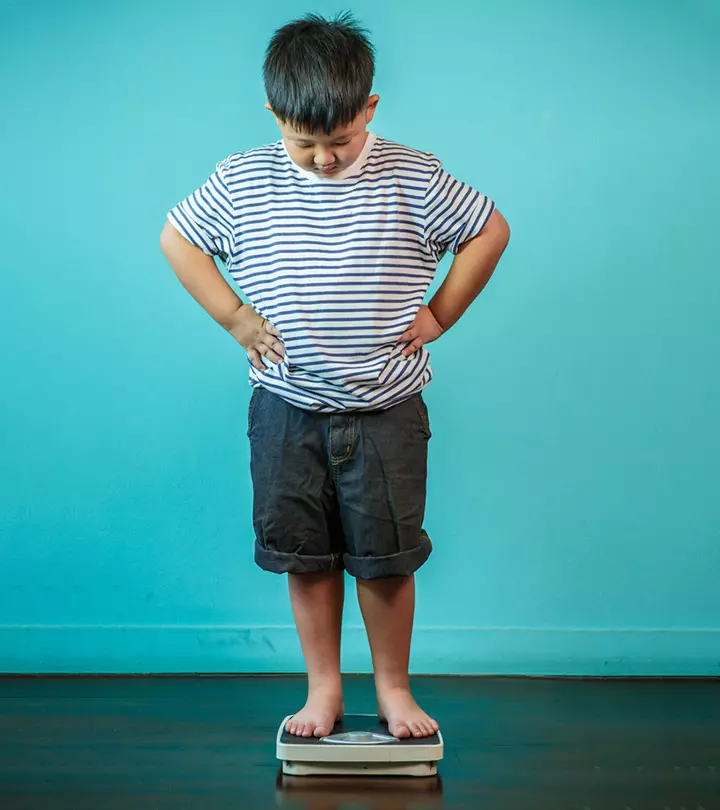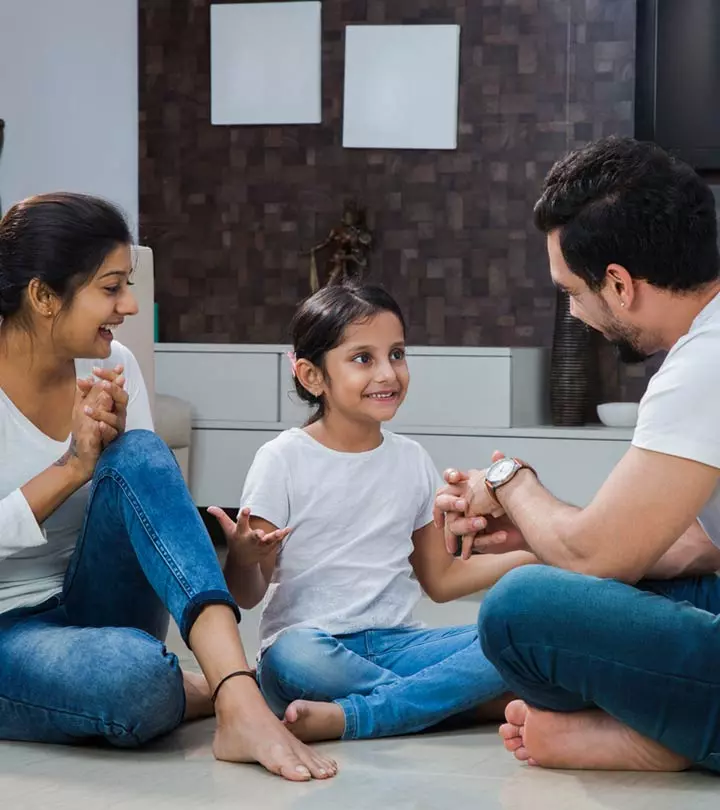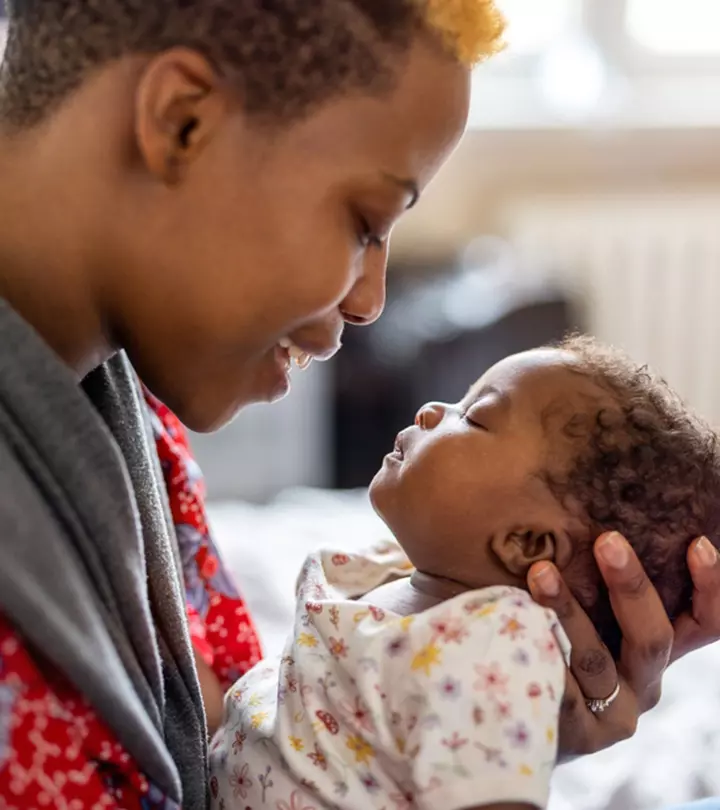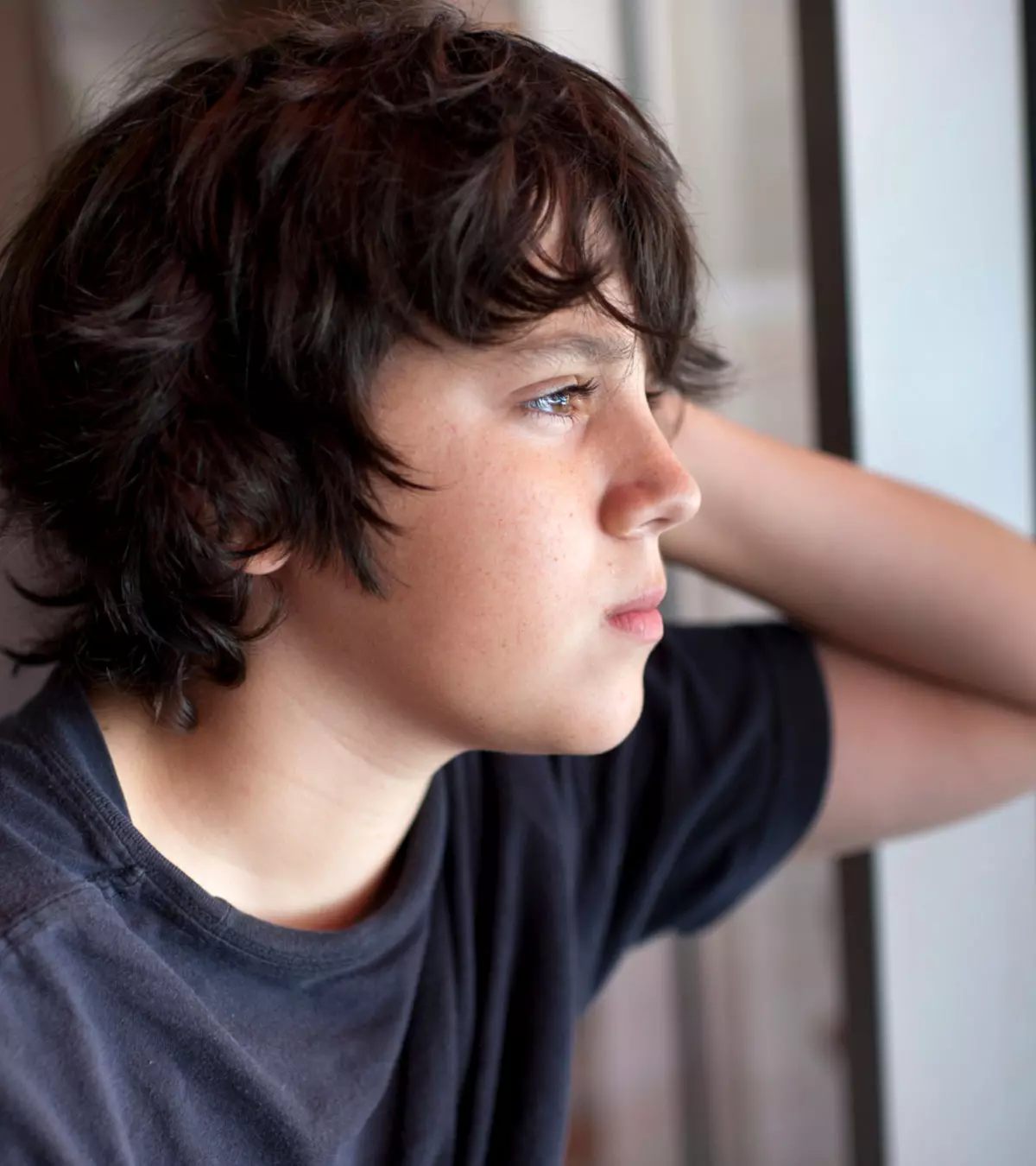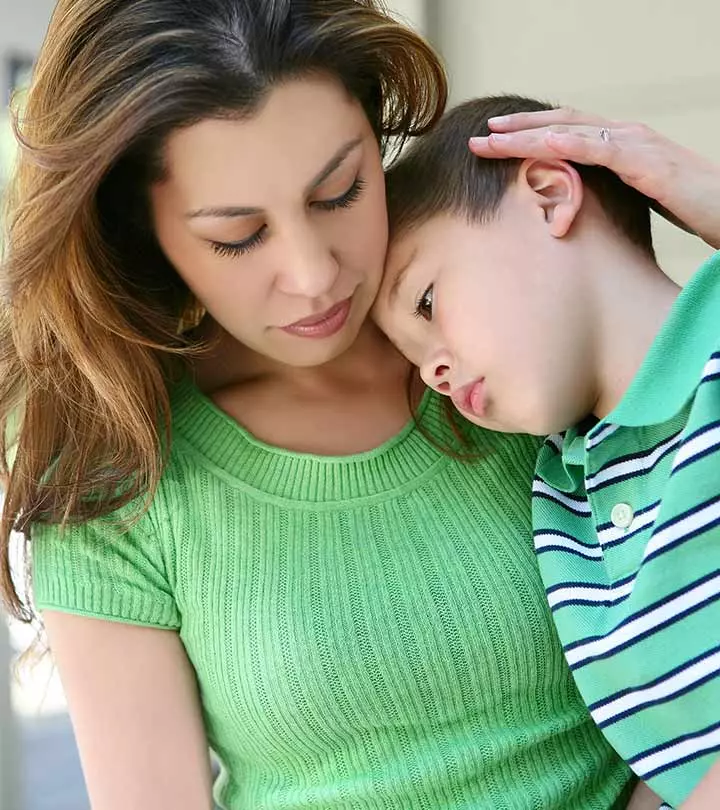
Image: ShutterStock
So, you are concerned about what’s bothering your adopted child and are trying to figure out what’s wrong with them. Psychological problems in adopted children can be seen very frequently, and the best way to address these issues is to learn more about your adopted child ‘s psychology. Adopted children may face psychological challenges due to early life experiences, which can significantly impact their emotional and social growth. Adoption is a legal procedure that involves a lot of emotions for you, your family, and your adopted child. Adoption often involves some of the key behavioral issues in children, which could pose obstacles in caring for your child. This post discusses some of the most frequent psychological issues that adopted children face, as well as how they might affect their health, well-being, and development.

Key Pointers
- One of the most common psychological and behavioral issues among adopted children is the feeling of rejection.
- Feelings of grief and despair that go unspoken owing to a sense of abandonment in your adopted child might lead to behavioral disorders.
- Adopted children may also have difficulty with their self-esteem.
Prominent Psychological Problems With Adopted Child
Adoption often negatively affects the attitude and behavior of adopted kids, so learning about psychological issues with adopted children is critical. Psychological and behavioral issues among other adoption problems may include (1):
1. Feelings of Rejection
If your child was adopted at an early age and does not remember the adoption, they may experience a wide variety of emotions, including rejection upon learning about the adoption. Possibly leading to withdrawal from communication or loneliness. Your child may think that their biological family did not like or want them or did not love them. The feeling of being unwanted or abandoned may affect your adopted child’s psychological health and development negatively. Feelings of rejection or abandonment may affect the behavior of your child adversely, so finding ways to make your child feel that they are an important part of your family are imperative.
Nyree, a biological mother of five and adoptive mother of two, talks about her experience of having a new baby in the house (her daughter was pregnant) and the impact it had on her two adopted sons, who are now teenagers. She says, “One of my sons, in particular, just seemed to be out of sorts… He kept asking about the baby – when the baby will come, why hasn’t the baby come yet, what will happen when the baby comes, etc… At the same time, I noticed that he was a little negative with my grandsons, who are quite young… I then sat him down and asked him what was going on, to which he replied, ‘I didn’t have my mum, I couldn’t have my mum.’
“He doesn’t blame us per se for what happened with his original family… But sometimes adopted children get triggered, and they can’t put into words what and how they are feeling… Once my daughter’s baby was born, my younger son kept asking when we were going to be able to see the baby… I believe that this is centered around his abandonment issue – he wants to see that the baby is okay, he wants to see if my daughter is okay, and he wants to witness the bond between the baby and my daughter… My sons didn’t receive the level of care they needed when they were younger and were neglected quite often. In a previous incident, they were really bothered and disturbed by a baby crying… Upon visiting my daughter’s baby, he made sure to tell me that this baby didn’t cry often and that he was content and looked after. They were both at peace when they realized this (i).”
 Trivia
Trivia2. Loss and Grief

Unexpressed feelings of loss and grief due to perceived abandonment may contribute to emotional trauma and behavioral problems in your adopted child. A myriad of emotions may include not only grief and loss, but also shame, disappointment, confusion, and curiosity. It is natural for your child to have questions about their biological parents. Also, if they are old enough to remember, your adopted child may grieve the loss of their biological siblings, grandparents, as well as friends, and other familiar environments (1).
3. Identity Queries
Your adopted child may suffer from issues related to self-identification on learning about their adoption. It could further lead to mental health issues such as stress, anxiety, and depression in them. Identity development can be more complicated in adopted kids. They will likely have many questions about their biological parents, where they lived, who they resemble, why their biological parents gave them up for adoption, and such. Your child may also ask you about their biological family traditions and heritage (2).
 Did you know?
Did you know?4. Self-esteem
The sense of self-esteem of your adopted child relates to her sense of belonging, identity, value, and dignity. Studies reveal that adopted kids score lower on self-esteem than their non-adopted counterparts (3).
5. Genetic Problems

Often, an adopted child doesn’t have access to their biological or genetic family health information. If your adopted child has a genetic history of any ailment or disorder, then they may not have appropriate knowledge of it. Lack of genetic health history may affect learning the right line of treatment (4).
6. Hypervigilance
Hypervigilance, commonly associated with PTSD, refers to a constant state of alertness for potential threats. In adoptees, this stems from the initial separation between mother and child, resulting in elevated cortisol levels and heightened reactivity. The child’s perception of danger becomes ingrained in the nervous system. Stress is triggered by sensory events, prompting the amygdala to initiate fight, flight, or freeze responses, activating the central nervous system. Insufficient cortisol release may lead to pervasive hypervigilance in adopted children, where every situation is perceived as a potential threat. Positive repetition in the environment and relationships plays a crucial role in mitigating this heightened state of alertness.
Frequently Asked Questions
1. Do adopted children have more behavioral issues?
Adopted children may exhibit behavioral problems such as oppositional behavior, aggression, depressive symptoms, self-harm, hyperactivity, violent tantrums, and sensory self-stimulation under stressful or exciting situations (8). However, there is no evidence to state that adopted children have more behavioral issues.
2. Do all adoptees have attachment issues?
Adopted children are most likely to experience attachment problems. However, older children are more likely than younger ones to experience attachment issues. Therapy and counseling will help treat many of these problems rising as the effects of adoption on children (8). Adopted children can benefit from various treatments, including family therapy, play therapy, and cognitive-behavioral therapy (CBT), to support their emotional well-being.
3. What are the seven lifelong issues in adoption?
A study published in the 1980s (“Seven Core Issues in Adoption”) highlights the significant lifelong challenges faced by adoptees. These include loss, rejection, guilt, shame, grief, identity, intimacy, and mastery/control (9).
4. How can schools and educators support the psychological needs of adopted children?
Schools and educators can aid adopted children by integrating adoption into lessons on diverse families, employing positive adoption terminology, accommodating assignment modifications, offering adoption resources, and assisting children in developing coping strategies for adoption-related queries and remarks from peers (10).
5. Why do adopted children struggle?
Adopted children may struggle due to various factors such as understanding their adoption, creating their identity, and dealing with curiosity about birth parents. Open communication, support, and professional assistance can help address any emotional or behavioral problems in adopted children (11).
6. Are adopted kids harder to raise?
Adopted children, especially those adopted at advanced ages, face unique challenges that may stem from previous trauma and unresolved emotions. Therefore, prospective parents must be ready to invest effort, demonstrate empathy, and utilize effective communication and parenting strategies to build trust, provide stability, and foster a secure relationship with their adopted children (12).
It is quite typical to see adjustment difficulties and psychological problems in adopted children due to rejection, abandonment, fear, feeling grieved or lost because of their biological parents. Identity crises, low self-esteem due to a loss of sense of belonging, and other factors could also be to blame. So, if your adopted child has any negative behavioral issues, it’s critical to figure out the cause, then handle the situation thoughtfully and compassionately. Giving them love and care will surely assist you in properly addressing their behavioral issues and considerably improving their general well-being.
 Point to consider
Point to considerInfographic: Therapeutic Approach To Psychological Problems In Adopted Children
While being welcomed into a caring family is a blessing for the adopted child, their past experiences can trigger mental health problems. These may interfere with their happiness for the new journey and affect the family as well. Here are a few therapeutic approaches to explore to help them overcome their issues and connect with their new family.
Some thing wrong with infographic shortcode. please verify shortcode syntax
Illustration: Common Psychological Problems With Adopted Child
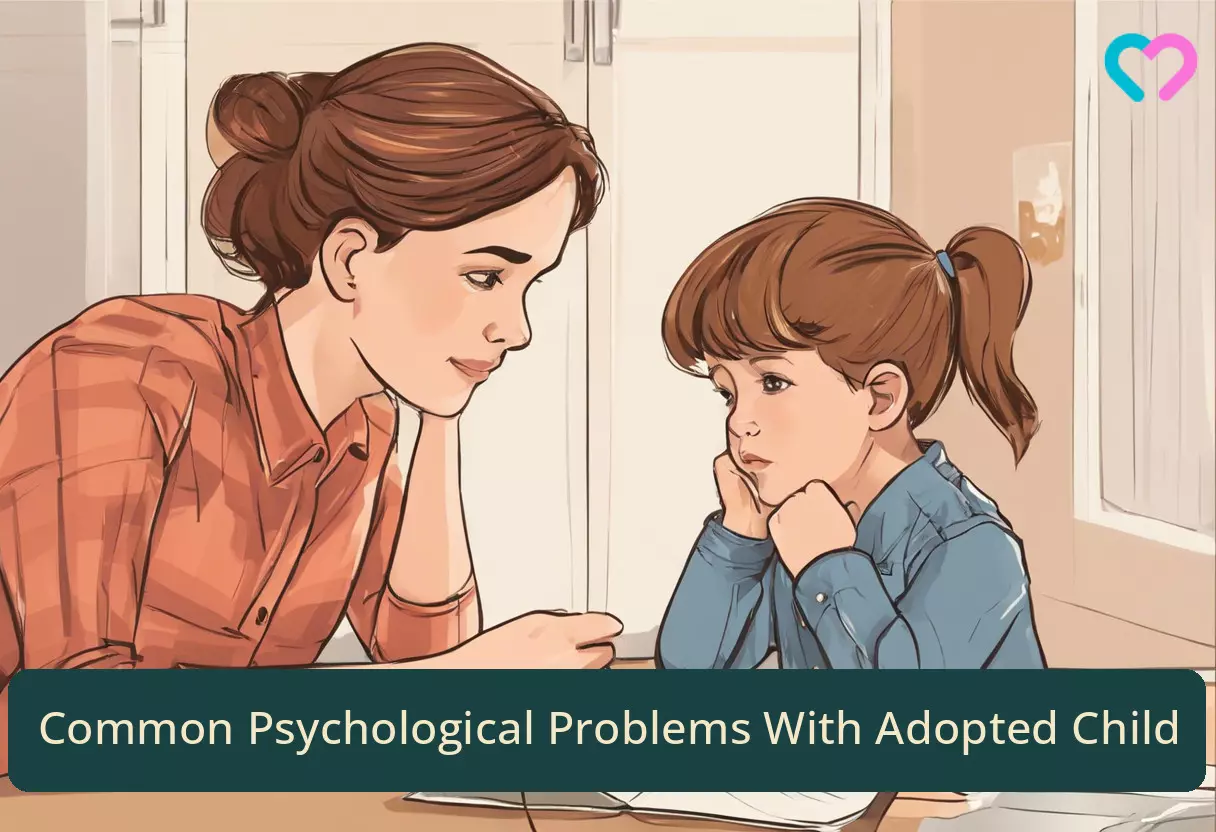
Image: Stable Diffusion/MomJunction Design Team
Adopting a child can be a rewarding experience, but it can also come with its own unique set of struggles. Learn about the 6 biggest challenges your adopted child may face in this heartfelt journey of adoption.
Personal Experience: Source
MomJunction articles include first-hand experiences to provide you with better insights through real-life narratives. Here are the sources of personal accounts referenced in this article.
i. Abandonment issues in adoption │our experiences│adoption family;https://www.youtube.com/watch?feature=shared&v=jP1ao_KOdk4
References
- Helping Adopted Children Cope With Grief and Loss.
https://www.childwelfare.gov/topics/permanency/adoption/ - Adoption and the Stages of Development.
https://hr.unc.edu/wp-content/uploads/sites/222/2025/04/Adoption-and-the-Stages-of-Child-Development.pdf - H. Norman Ames; (1996); The Influence of Adoption on Self-Related Social-Emotional Characteristics of Adopted Children and Adolescents.
https://digitalcommons.usu.edu/cgi/viewcontent.cgi?article=2017&context=gradreports - Robbie J Steward and Betty Jane Lynn; A Study of Self- Esteem In Adopted and Non-adopted Adolescents.
https://files.eric.ed.gov/fulltext/ED318940.pdf - Growing Up Adopted: Study Highlights Health, Happiness of Adopted Children.
https://cradlehope.org/adoption/growing-up-adopted-study-highlights-health-happiness-of-adopted-children/ - Joseph Westermeyer et al.; (2015); Personality disorders in adopted versus non-adopted adults.
https://pubmed.ncbi.nlm.nih.gov/25752207 - Borderline personality disorder and adoption
https://aapel.org/bdp/BLadoptionUS.html - Behavioral and emotional issues in adopted children.
https://www.chop.edu/conditions-diseases/behavioral-and-emotional-issues-adopted-and-foster-children#:~:text=Children%20who%20are%20adopted%20may,%2C%20aggression%2C%20depression%20and%20anxiety. - Exploring the 7 Core Issues of Adoption.
https://blog.cincinnatichildrens.org/learning-and-growing/exploring-the-7-core-issues-of-adoption/#:~:text=The%20seven%20core%20issues%20the,crop%20up%20throughout%20one’s%20life. - Parenting Your Adopted School-Age Child.
https://health.uconn.edu/adoption-assistance/wp-content/uploads/sites/68/2016/07/Parenting-Your-Adopted-School-Age-Chil.pdf - Adopted Children.
https://www.aacap.org/AACAP/Families_and_Youth/Facts_for_Families/FFF-Guide/The-Adopted-Child-015.aspx - The Joys and Challenges of Parenting Older Adopted Children
https://adoptioncouncil.org/publications/adoption-advocate-no-77/
Community Experiences
Join the conversation and become a part of our nurturing community! Share your stories, experiences, and insights to connect with fellow parents.
Read full bio of Kintla Striker
Read full bio of Kalpana M
Read full bio of Rebecca Malachi
Read full bio of Apoorva K










